When I was in the Navy, I briefly kept a journal in a little notebook stamped with my name on the cover: SN RULAND. I don’t think I lasted more than a page or two before one of my shipmates found it and, of course, he read it and, of course, he made fun of me for it. I would have done the same.
I wrote plenty of embarrassing things while I was in the Navy. Letters home to girlfriends. Song lyrics. Feelings.
I was stationed in San Diego and our ship was supposed to go to the Persian Gulf for six months. On our way to Hawaii, we learned that the USS Stark had been attacked. We were going to war. And then suddenly we weren’t. Instead, we went on a six-month good will tour of the Western Pacific. Instead of six months patrolling the Persian Gulf, we visited a dozen different cities in Asia and Australia, some more than once.
All of this felt momentous to me and I wanted to keep a record of it, but I didn’t have the time or the tools to do so.
The journal my shipmate got a hold of was a record of the weather, where we were traveling to and from, and how fast. My shipmate, whose name was Puckett, a lunatic from Las Cruces, New Mexico, ridiculed me for—and rightly so.
I wrote: ‘bout 20 knots. Puckett seized on the contraction and how it signaled a shift into the voice of a salty seafarer, a voice I hadn’t earned. I was a kid trying on the voice of someone with more experience, more authority, and he dragged me for it. My shipmates would ask Puckett a question:
Hey, Puckett, when does lunch start?
’Bout twenty minutes!
That put me off journal writing for a while, but even before I enlisted, I had a love/hate relationship with journals.
I wanted to be the kind of person who filled up notebooks with a record of their days and all their deepest thoughts. I’d buy a new notebook and maybe a new pen, write down the date in the upper-right corner, and compose something super interesting. Then, invariably, I’d get bored.
Sometimes it was after a couple weeks, usually it was just a few days. I have some journals with just one entry and some that are completely blank.
What was I going to write about? The TV shows I watched? The drudgery of Catholic school? The sameness of my paper route?
I didn’t get serious about journal writing until I went to Ireland. Ostensibly, I went to Ireland to present a paper on Finnegans Wake at the International James Joyce Symposium, but after four years of college in southwestern Virginia, I was ready for an adventure. I rented a car and traveled all over Ireland for a week before I was due in Dublin and I wrote every bit of it down in a giant ledger I brought with me.
I went to see Waiting for Godot in Irish in Galway. I got my rental car stuck in the sand on a finger of land called Inch. I rode a bicycle all over the Aran Islands while listening to Jane’s Addiction. When I got to Dublin I met so many people: scholars, journalists, students. I wandered St. Stephen’s Green, stayed in a hostel inhabited by ghosts and rabbits, and spent entire afternoons reading Samuel Becket at the Trinity College Library after smoking epic quantities of hash.
My journal captures all kinds of small moments too: a joke a drunk fellow told me in a bar, my plans to turn my experience on Inch into a play, moody brooding about a girl I met at Hardee’s back in Radford, Virginia, and still had a huge crush on, a girl I’d completely forgotten about until I opened the pages of this journal a few days ago.
As a document, it’s almost unreadable (and not because my handwriting is so small). I was reading lots of Joyce and Beckett and experimenting with language. It’s arty. It’s cryptic. It’s a heady blend of things that had happened to me, things I was imagining into being, things I wanted to conjure into existence. It’s a record not so much of the facts of my existence but the stuff in my head, a journal of the imagination.
This set the tone for my approach to journal writing. I’d be writing about the weather in one sentence and the dialog for a novel I was writing the next. It’s a reliable record of what was passing through my mind but an unreliable account of what actually happened. Puckett would probably say it was pretentious.
But something changed for me in Ireland. I’d done everything I was supposed to do up to that point in my life. I’d completed twelve years of Catholic education and six years in the Navy. I’d used my VA benefits to go to college and get a degree. I’d established a path for graduate school—if I so desired. But was that something I wanted anymore?
I wanted to explore the world. I wanted something bigger than what Virginia could deliver. When a shipmate invited me to come live with him in North Hollywood (Hi Skip!) I took it as a sign. My cousin Mark and his wife Theresa also lived in North Hollywood, making the decision to move across country feel less like a lark and more like fate. At least that’s how I wrote about it in my journal.
I got a job at Eagles Coffee Pub on Lankershim Boulevard in North Hollywood and met a million people. I started going to shows. Skip took me snowboarding, introduced me to Pennywise, Down By Law, and Rage Against the Machine. We started an open mic at the coffee shop called Skinny Leonard’s Free Verse. I read lots of pulp fiction. I was particularly enamored with Jim Thompson and crime stories in the LA Times. I’d buy cheap paperbacks at the Odyssey, perform at the open mic at the Iguana Cafe, and go see Fugazi, Mudhoney, Soul Asylum over the hill in Hollywood. My cousin screened movies for me: Abbot & Costello Meet Frankenstein, Paths of Glory, Reservoir Dogs. Noir was everywhere and it informed the spoken word pieces I wrote, many of which were lifted directly from my journal.
Everywhere I went I met more people and everyone I met was from somewhere else. We’d all come to LA for something we couldn’t find back home. I didn’t know what I was searching for, but it was inspiring to be surrounded by all these dreamers. I wrote about all of it—the people, the books, the music, the movies—in my journal. Keeping a journal, writing in it, reading from it, become part of my identity.
Then life happened. I went to grad school in Arizona. I got a job in advertising in LA. I wrote for punk zines and wrote novels on the side. All of which led me away from writing in journals and into technology’s dark embrace. It happened to nearly all of us.
About ten years ago I went to Merida with Nuvia. She was attending a conference and I took time off from work to tag along. I had big plans to do a lot of writing but when I arrived in Mexico I realized I’d forgotten my laptop charger. I bought a notebook and filled it up with a story I was writing. I bought another one and filled that one too. I always kept a journal for reminders, stray thoughts, things I needed to do, but writing longhand kicked something loose. Since then I’ve written nearly all of my stories by hand and when I travel I always keep a journal with me that I can fit in my pocket.
I’ve been revisiting my old journals from 1993 because my new novel is set in 2023 and 1993. A music journalist is searching for a musician who disappeared in 1993. The musician and the writer were close friends and got to know each other at a place very much like Eagles Coffee Pub in North Hollywood. The novel opens with the writer spinning his wheels in the LA and SD music scenes circa now before he embraces the quest to find his old friend. Part II is set in 1993 and is told through the musician’s journals up to the point where he disappears.
When I was in Santiago, I wrote in my journal as if I were the musician. I’d go to a café and pretend like it as 1993. I’d look at people passing by on Paseo Ahumada and imagine the San Fernando Valley choked with smog. Sometimes these worlds communicated with each other, such as when I took a bus to the coast while the musician was riding a Greyhound to Washington. I filled up a notebook with these entries and started another one. When I got home, I wanted to go back to those journals from 1993 and see what I was thinking about.
The best thing about writing in a journal is that when you’re writing in a journal you’re not looking at a screen. I don’t want to sound like a hypocrite: I’m writing this newsletter in my digital journal, a Word doc I started in 2015 and is 363,348 words long and counting. It’s the place where I set down ideas, thoughts, feelings, everything. However, the older I get the more I’m drawn to ink on paper. Writing the date in the top-right corner of a new notebook or journal followed by place where I’m writing—especially if it’s a place I’ve never been before—will always feel romantic to me.
It's too early to say what my new novel will be about. I’m calling it my punk rock Savage Detectives. But Part II is a love letter to Eagles Coffee Pub in 1993. It’s the incubator for all that happens in the novel just as it was for me and so many others who spent time there, searching for… something. Call it the ineluctable modality of dreams, or ambition, or even smog.
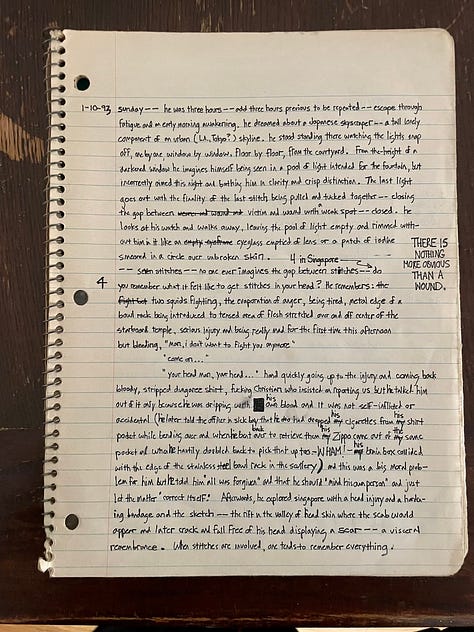
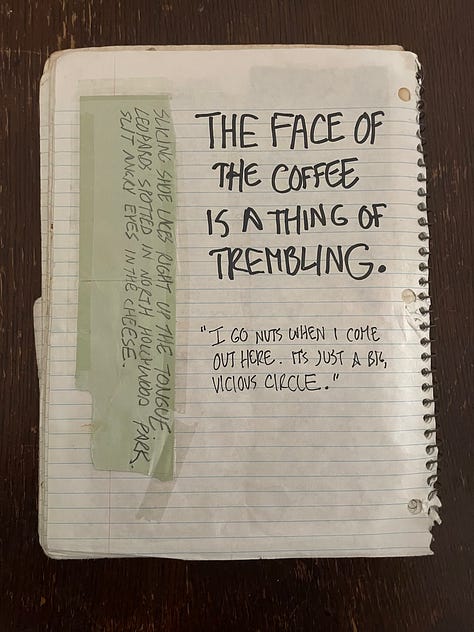
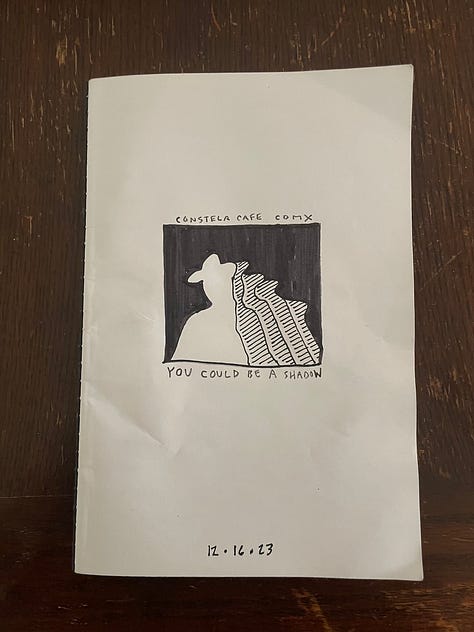
Future Travel
My friends at Strange Daze Books (Hi Andrés!) like to tease me that I’m always traveling, but aside from a few trips to LA I’m going to be in San Diego for the next few months. I am, however, starting to make plans to travel to Europe in April, which will include stops in Spain, Germany, and Poland.
Although I’m currently searching for and speaking with publishers for foreign language editions of Corporate Rock Sucks, I will be doing some events for Do What You Want in Barcelona and possibly Poland. The best part about traveling to Santiago was meeting so many people invested in the punk rock scene there. So if are (or going to be) in Spain, Germany, or Poland in April, drop a line and say hello!
Razorcake Panel at Pop-Hop, Friday Jan. 12 at 7pm
Please note there’s been a change of venue for this weekend’s event. Pop-Hop is not far from where we used to have Vermin on the Mount in Highland Park so this will be a bit of a nostalgia trip. Melissa, Kiyoshi, and Todd are all extraordinary artists and genuinely great people. Nuvia and I are really looking forward to this event and we hope to see you there!
If you’re new-ish here and you liked this newsletter you might also like my new novel Make It Stop, or the paperback edition of Corporate Rock Sucks: The Rise & Fall of SST Records, or my book with Bad Religion, or my book with Keith Morris. Message from the Underworld comes out every Wednesday and is always available for free, but paid subscribers also get Orca Alert! every Sunday. It’s a weekly round-up of links about art, culture, and science you may have missed while trying to avoid the shitty news of the day.



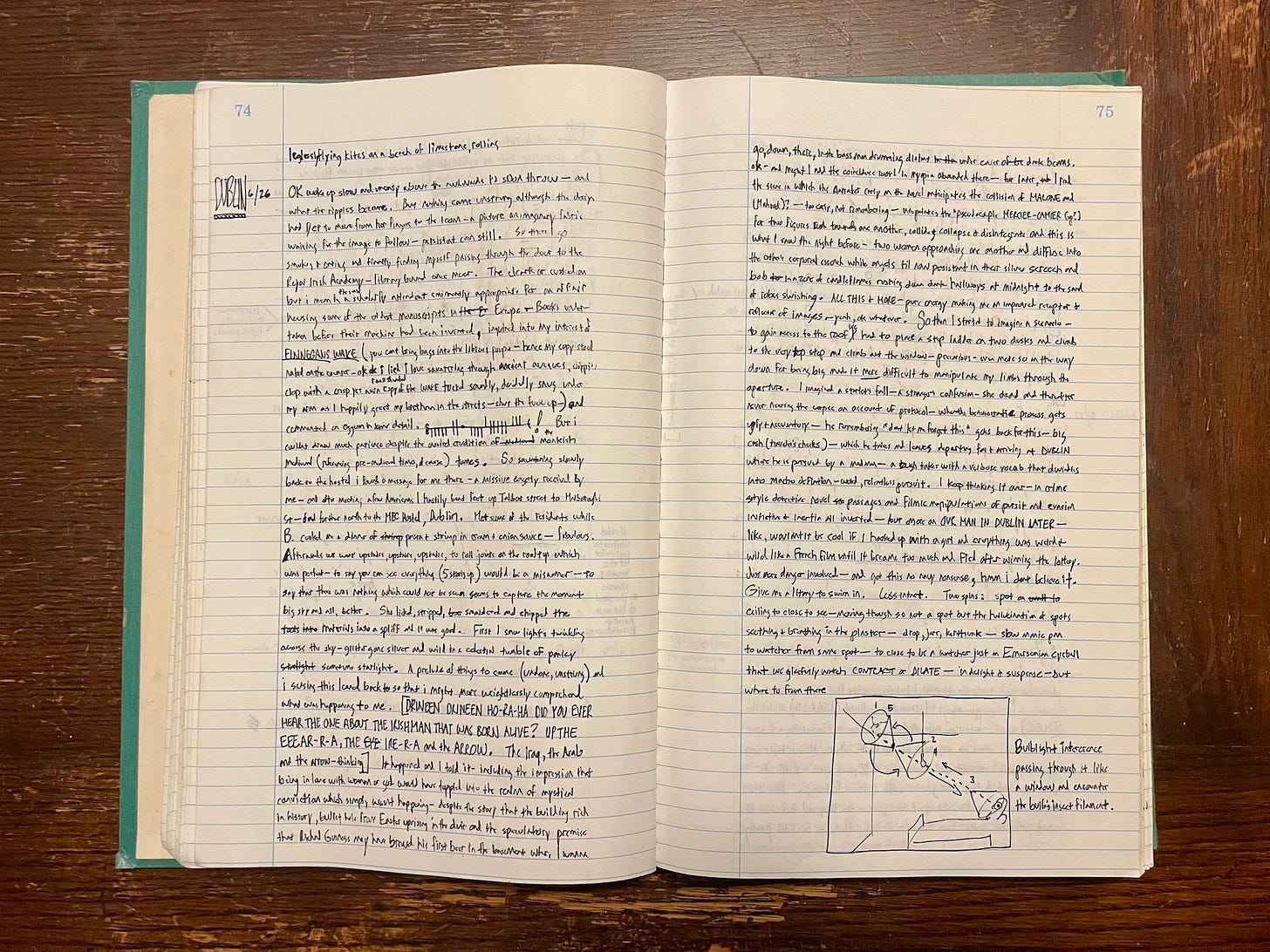

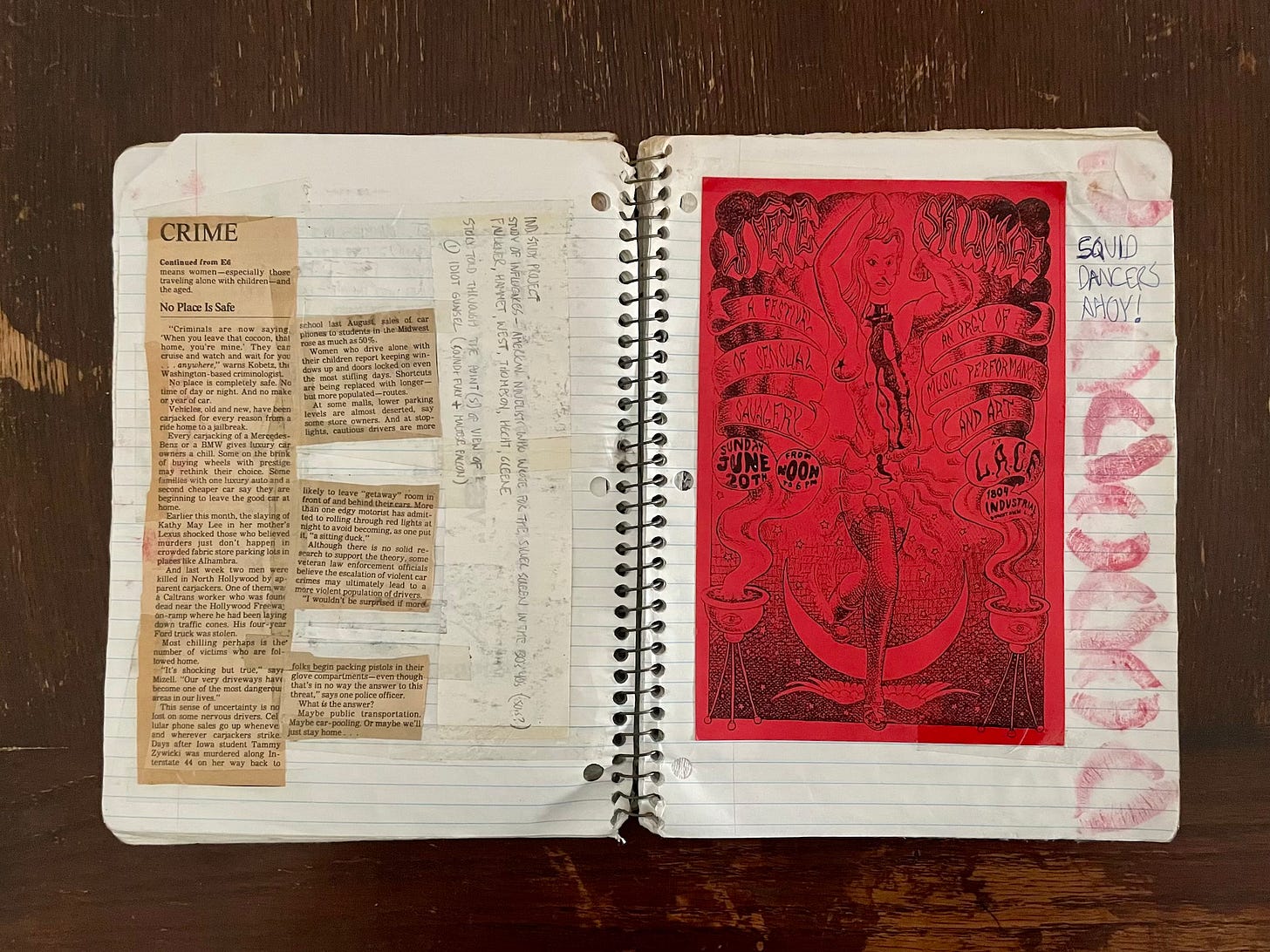


wfg. in irish. in galway. holy cats.
this is one of the coolest things ive read of you since, my damage. dont stop, please.-deg
I've got more!